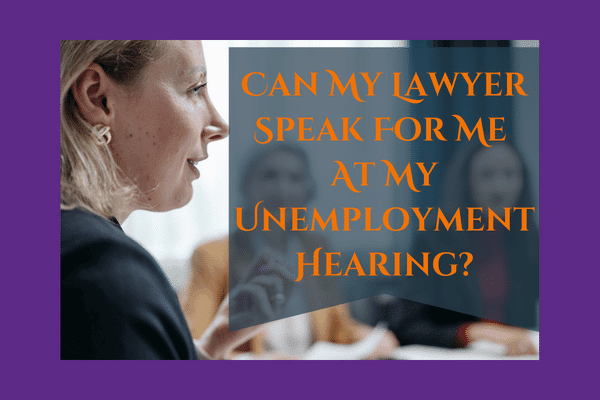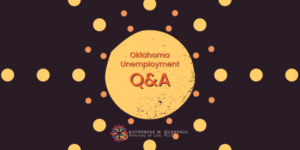Recently several people have asked me this question: Since/If you’re my lawyer, can you do all the talking for me at my unemployment appeal hearing? The short answer is no.
What is the hearing?
Because you (or your employer) filed an appeal to an unemployment decision, OESC scheduled a hearing to review the case. It is an administrative hearing – which is less formal than district court. But it is still a legal proceeding. As a result, there are certain rules that must be followed.
Unemployment Appeal Hearings are De Novo Review
Unemployment hearings in Oklahoma are considered de novo hearings. That’s a Latin term that means “from the beginning” or “new.” So the hearing officer is starting from scratch with making a decision about your claim, just like OESC did when you first applied for benefits. The hearing officer must base their decision ONLY on the evidence presented at the hearing, which typically includes documents and sworn testimony given in the hearing.
What is testimony?
Simply put, testimony is a person’s spoken statement in court or other legal proceeding. Prior to giving testimony, a person must affirm an oath to tell the truth.
What is first-hand testimony?
First-hand testimony is a statement given by someone who was part of or saw the event being described. For example, if the event was a car accident between 2 cars, the 2 drivers, their passengers, and any bystanders who saw the accident could all give first-hand testimony about the accident. Anyone who was not there, would be giving second- or third-hand testimony. The person giving the testimony is called a witness.
In the unemployment setting, here’s a list of witnesses who may attend a hearing & whether they’re first-hand or not:
- Claimant’s side (the person who applied for unemployment benefits)
- Claimant – First-hand
- Claimant’s significant other/Friend who Claimant talked to about the incident – Second-hand
- Claimant’s former Co-worker who stopped working before the thing that caused Claimant to separate – Second-hand
- Employer’s side
- Person who fired Claimant/accepted Claimant’s resignation – First-hand
- Co-worker who saw Claimant punch someone – First-hand
- Susie HR who processed the paperwork but was not there when Claimant was fired – Second-hand
- President/Owner/Director of Company who didn’t even know Claimant – Second-, Third-hand
- Manager/HR/Other person who was hired after Claimant separated – Second-hand
Why does first-hand testimony matter?
The hearing officer must weigh the evidence they receive at the hearing when they make their decision. That means that some evidence is more important than other evidence. Wanna know the [typically] most important evidence? First-hand testimony. The hearing officer gives more weight to testimony from people who were part of the event they testified about. That doesn’t mean they don’t factor in testimony from other people, but it does mean that testimony may be less important than first-hand testimony.
So can my attorney speak for me?
No. Unless your attorney was there for the thing your case is about, your attorney is not a witness – and certainly not a first-hand witness.
Your attorney’s role is to help you understand and navigate the legal process of the hearing. She is responsible for helping you present your case in the best way to have a favorable outcome (if possible). At the hearing, your attorney will consider exhibits and make objections when appropriate, question you when you testify, cross-examine or question the witnesses on the other side of the case, and make legal arguments about why you should win.
Your role at the hearing is to provide first-hand testimony about what happened that caused you to leave your job. No one can do that for you.
Your Next Steps
If you have more questions about testifying at your hearing, or about anything else related to unemployment appeals, let us know. You can send us a message on Facebook or you can schedule a meeting at a time that works best for you.


